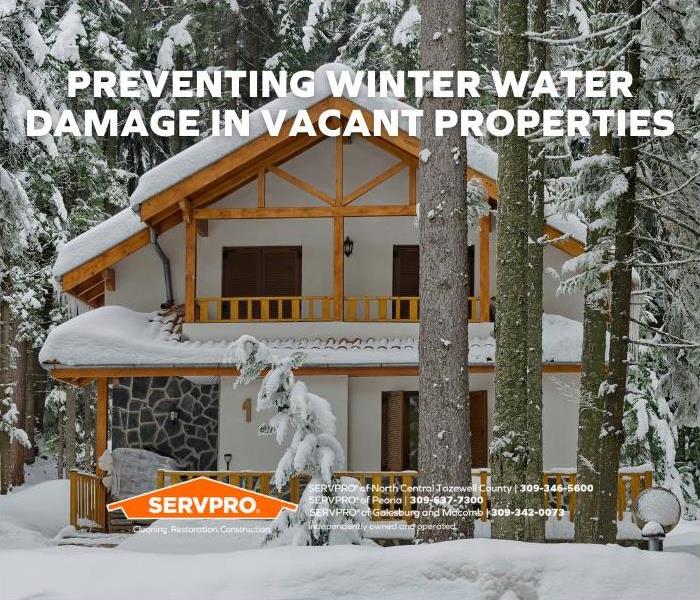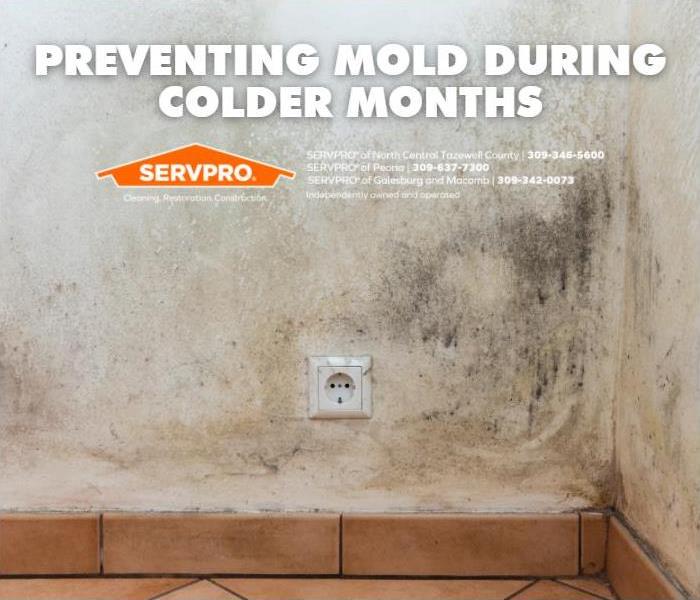Recent Water Damage Posts
Indoor Flooding: What To Expect and How to React
12/12/2024 (Permalink)
 No matter the flood source, SERVPRO has you covered. Rely on us for fast, professional help when disaster strikes!
No matter the flood source, SERVPRO has you covered. Rely on us for fast, professional help when disaster strikes!
We know that every second counts when disaster strikes. That’s why we have a fast, reliable process designed to prioritize your needs. Within four hours of your call, we’ll be at your doorstep with a plan in hand. Eight hours later, your insurance will be in touch to start the claims process.
Why so fast? Here’s the breakdown:
1–24 hours:
- Metal tarnishes and rusts
- Drywall swells and deteriorates
- Furniture cracks from water absorption
- Musty odors spread
- Dyes and inks stain
48 hours to 1 week:
- Doors/windows warp
- Metal corrodes
- Paint bubbles
- Wood floors warp
- Mold growth begins
How to Limit Damage Until Help Arrives:
- Shut off the water source if possible, or contact a qualified professional to stop the water flow.
- Remove as much excess water as possible by mopping or blotting.
- Wipe excess water from wood furniture after removing lamps and other tabletop items.
- Remove and prop up wet upholstery cushions for even drying.
- Place aluminum foil or wood blocks between furniture or wet carpeting.
- Move any paintings, art objects, computers, documents, and other materials that are valuable or sensitive to moisture to a safe, dry place.
- Don’t use a household vacuum to remove water, as this could cause electrical shock or damage the vacuum.
- If sewage is involved, avoid all contact. Also, do not use HVAC systems or fans to dry the structure, as this could spread contaminated air.
Don’t wait—call us right away if you see these signs. We’re here 24/7, 365 days a year.
More Winter Water Damage Tips
1/9/2024 (Permalink)
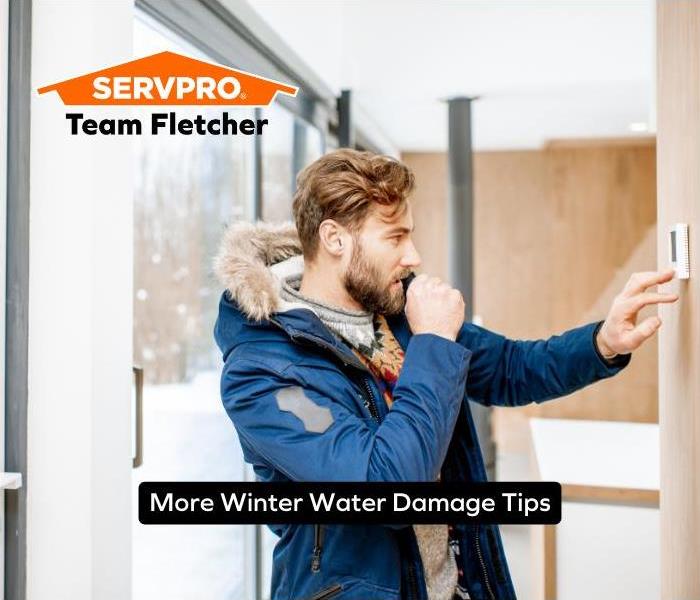 Keeping your thermostat running while away can save you from frozen pipes
Keeping your thermostat running while away can save you from frozen pipes
Although it hasn’t been too long since we shared some tips for staying dry in the winter, we thought we should let you know about some other things that homeowners should be aware of to keep your property safe from water damage this winter.
Don’t freeze the sump pump!
Something many people overlook is protecting their sump pump from the elements in the winter. Sump pumps can malfunction if exposed to the harsh cold of winter, so a winter storm could render your pump useless. What good is a sump pump if it can’t drain water when you need it to the most? You can wrap the discharge line with insulation tape or foam to keep it from freezing. Check the discharge pipe regularly to make sure it isn’t clogged by any residue or ice.
Utilize your thermostat
If you’re leaving for an extended period of time, don’t simply turn your furnace off and leave! You can put your thermostat at a very low temperature, but warm enough that pipes in your home won’t freeze. Good insulation is key, but keeping your thermostat at around 55 degrees Fahrenheit could make the difference between a dry home and an unfortunate pipe leak.
What about appliances?
Appliances that have a water line or hose should not be neglected in your winter water damage walk-through. Make sure these are connected securely and aren’t exposed to the elements of winter; a small leak can turn into a big problem over time.
Check your pipes
While taking action to keep your pipes well insulated from the weather, you should check the integrity of your pipes while you’re at it. Check the areas around your water pipes to make sure there are no signs of moisture, such as water stains and condensation. If you’re unsure about what you’re looking at, ask a professional to check your plumbing for you. The earlier you can detect a faulty pipe and fix it, the less water damage you have to deal with in the future.
Even if you follow all our tips to a T, disastrous weather can bring water damage to even the most prepared homeowners. If you find yourself in this situation or have any questions about winter water damage prevention, please give us a call at (309) 346-5600.
A Guide to Staying Dry Through The Winter
9/22/2023 (Permalink)
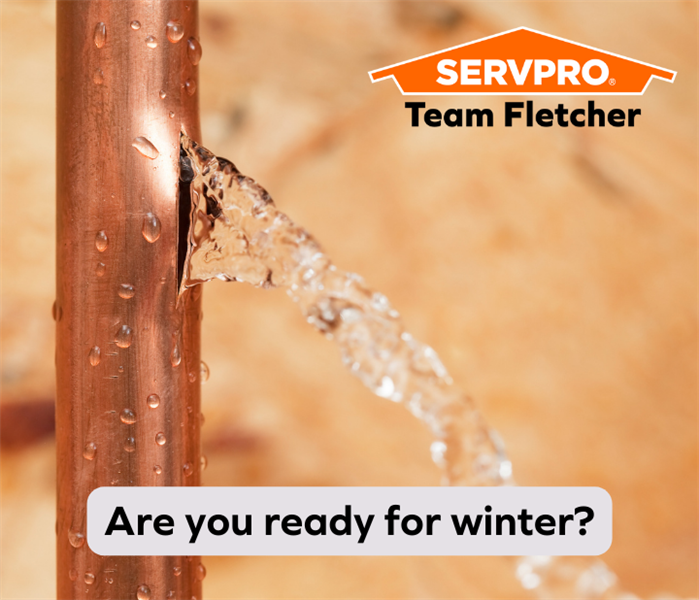 Winter water damage can get costly--be prepared!
Winter water damage can get costly--be prepared!
After the hot and humid summer we survived this year, there’s no better feeling than opening up your windows and feeling the fresh air throughout your home. But this feeling won’t last too long as we look towards another freezing winter ahead, and with winter comes more extreme weather and more opportunities for moisture to enter your home. So with that being said, we think it’s never too early to start protecting your home from winter water damage. Here are some things for you to check so you can be sure you’re fully prepared for the upcoming winter:
Give melted snow a path to drain
Your roof and gutters might have handled normal rains in the summer with ease, but it’s always a good idea to check on them before the winter weather rolls in. Make sure your gutters are clean, structurally sound, and drain to appropriate channels that move the melted snow away from your house.
Stop ice dams in their tracks
What are ice dams? Ice dams are buildups of snow and ice that can prevent water from draining properly on a roof. Because of this, pools of water accumulate on your roof which can lead to messy roof leaks. Typically, they form on roofs of houses that have uneven heating. This can occur because of issues with insulation or windows and walls that are not sealed properly. Make sure your house is properly sealed and insulated if you want to prevent ice dams from forming.
Don’t let pipes freeze on you
One of the most common causes of water damage in the winter is from broken or burst pipes due to freezing. You should make sure that all pipes are protected from the outside elements by using insulation, and when the outside air reaches extremely freezing temperatures, always keep a trickle of water run from the faucet. This can help you prevent a costly pipe repair and flooding of your home.
Pack up your outdoor hoses
If you leave your hose screwed into the spigot, there’s a good chance that there’s some water sitting in both the hose and spigot, which can cause damage to them and even the pipe leading to it. It’s best to unscrew the hose and put it in storage for the winter until you need it again.
As long as you take steps to protect your home from moisture today, you’ll have a lot less to worry about when winter strikes in central Illinois. If you have any questions about winter water damage, please call us at (309) 346-5600.
Our Top Tips for Avoiding Water Damage on Summer Vacation
6/27/2023 (Permalink)
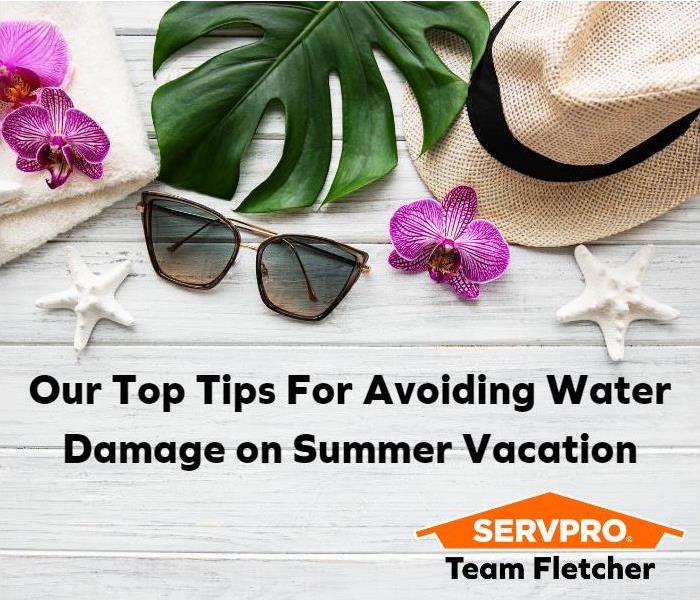 SERVPRO Team Fletcher is here with some tips to keep you safe during the Summer!
SERVPRO Team Fletcher is here with some tips to keep you safe during the Summer!
It’s Summer Break! Now that the kids are out of school and the summer sun is shining, many households are planning their summertime getaways. While you might be planning to be away from your home the responsibilities and risks of being a homeowner never go on vacation.
Large storms or unaddressed leaks—even minor ones—bring unwanted water into your home that can lead to property damage. Believe it or not, many homes experience water damage just due to neglecting a few key things while away on vacation.
Here are some tips to give you peace of mind so you can fully relax:
Test your sump pump before leaving
If you have a sump pump installed in your home, making sure it is working properly can turn a disastrous situation into a non-issue. You can try unplugging the sump pump and plugging it back in, and if you hear it kick on, chances are your sump pump is in working order. Another way you can test it is to pour a five-gallon bucket of water into the sump pit. If it doesn’t turn on after that, have someone come by to repair it before you leave.
Make sure you don’t leave behind any leaks
A small leak can seem like a small issue if you’re there to keep up with it, but things can go south quickly if they get any worse while you’re away. Double-check your roof, pipes, and connectors to appliances to make sure everything is sealed properly. Repair any leaks you find immediately.
Shut off your water supply
Turning off your water main or water supply can be a good idea for homeowners who won’t need the water while away from the home. A leaky pipe can’t leak if there’s no water passing through!
Have someone come by to check on things
The sooner you catch water damaging your property, the easier the mitigation and restoration process will be. So have a person you trust come by to check your property and they can report anything out of the ordinary. It can make a huge difference!
Peoria 24 Hour Emergency Water Damage Service
6/29/2022 (Permalink)
 This commercial water loss was received on a weekend and SERVPRO of Peoria was on-site quickly to mitigate further damage and begin the drying process
This commercial water loss was received on a weekend and SERVPRO of Peoria was on-site quickly to mitigate further damage and begin the drying process
SERVPRO of Peoria is available 24 hours a day for water emergencies, large or small. When you are dealing with water damage, immediate action is crucial. A delay of just a few hours can greatly increase the severity of the water damage.
We understand that when you call us, you may be feeling confused, stressed, and vulnerable. You need an expert to guide you through this crisis. SERVPRO of Peoria has the specific water damage training and experience to help you through this tough time. We specialize in water damage restoration—in fact, it's the cornerstone of our business.
What should I expect when I call SERVPRO?
When you call, we will ask several questions regarding your water damage emergency. These questions will help us determine what equipment and resources to bring, including how many trained SERVPRO Professionals may be needed.
Our SERVPRO Representative will ask several questions:
- Your name and contact information
- Your insurance information (if applicable)
- The street address of the water-damaged home or business
- When did the flooding or water damage occur?
- What caused the water damage (if known)?
- Is there electricity available (on-site)?
About SERVPRO of Peoria
SERVPRO of Peoria specializes in the cleanup and restoration of residential and commercial property after a fire, smoke or water damage event. Our staff is highly trained in property damage restoration. From initial and ongoing training at SERVPRO’s corporate training facility to regular IICRC-industry certification, rest assured our staff is equipped with the knowledge to restore your property.
Is Water Damage Covered in Your Policy?
6/16/2022 (Permalink)
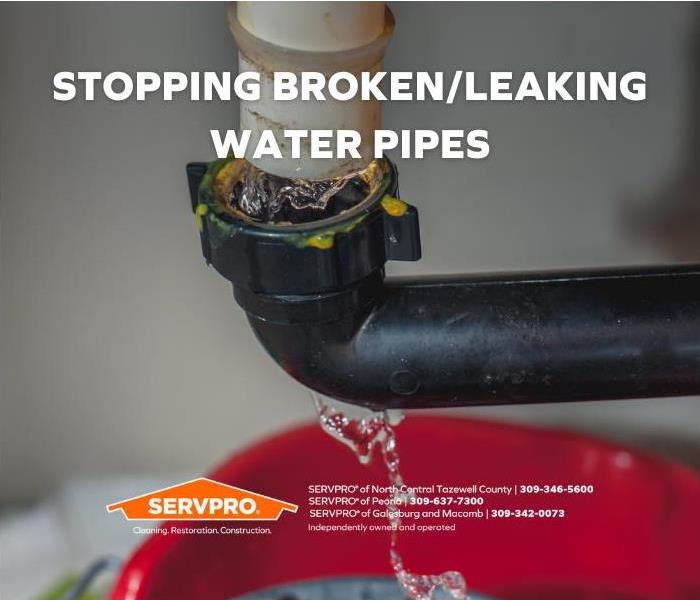 Review Your Policy and Make Sure You're Covered for Water Damage.
Review Your Policy and Make Sure You're Covered for Water Damage.
Did you know that not all Homeowner's policies cover water damage?
For example, a flood can cause water to back up into the home and cause damage. Some insurance companies don't list, Water Back-Up of Sewers and Drains, on the Homeowner's policy. This is an extension or additional service/ add-on that the homeowner must add to their policy. In the event that a storm causes water damage, you want to make sure your property is covered.
Who should I call when I experience water damage?
A storm, flood, or plumbing problem can leave your home with extensive water damage. Immediate action is necessary to mitigate the damage. SERVPRO’s professionals specialize in repairing and restoring following residential water damage.
Our customer-focused professionals will assess the residential water damage to your property. Then, we’ll help you understand the severity of the damage so you’re able to make the best decisions for the restoration of your home. Our top-notch people use the most advanced equipment to detect hidden moisture and extract standing water.
We have more than 50 years of experience in repair and restoration so you can trust us to help you develop a water damage restoration plan to help ensure your home is clean, dry, and restored to its pre-damaged condition.
Prevent Winter Water Damage in Vacant Properties
12/8/2021 (Permalink)
Winter is officially here as of December 21st, and in Central Illinois, that means we can expect some pretty low temperatures. Freezing temperatures can be devastating to your property. It helps when you can be present and deal with problems in real-time. However, there are properties that are vacant during the winter, either because nobody lives in them or because the people who do live in them are on vacation or spend their winters in a warmer location. This leaves these properties susceptible to damage with nobody around to take care of the damage at that moment. The best thing you can do is to do whatever you can to prevent the damage from happening. The following are some tips on how to do just that.
Shut off the water
You can do this yourself by shutting the water to the house off at the outside meter. You can also call in a professional to do so if you aren’t sure what you’re doing.
Prepare your water heater
Turn off the gas/electricity to the water heater and make sure to completely drain the water so there is nothing in it that can freeze.
Drain the system and open the lowest faucets
Drain the water from all sources. Drain water from toilets, sinks, tubs, and anything connected to the plumbing and pipe system. Keep the lowest faucet on the property open until the draining process is complete.
Use antifreeze
Pour environmentally safe antifreeze into drains once you have drained all of the water from them. This will help to keep any remaining or trapped water from freezing.
Tape toilets shut
Once toilets are drained, make sure they are closed and that there is a note left that they are not to be used. This will help to prevent unnecessary messes, as well as prevent the need to turn on the water for a short period and start the winterizing process all over again.
Set your thermostat to 55° or higher
If for any reason you do need to leave the heat and water on in your home or on vacant property, make sure the temperature is set to remain 55° or higher to prevent any freezing.
If you do experience water damage to your vacant property this winter, just remember that you can always contact your local SERVPRO® for the cleanup and restoration. We are Here to Help®.
https://nreig.com/protect-your-vacant-property-from-water-damage-this-winter/
Preventing Mold During Colder Months
11/3/2021 (Permalink)
When the weather gets colder, we spend much more time indoors. That means if you have a mold issue, whether you know about it or not, you could start experiencing some horrible side effects. That said, there are plenty of things you can do to prevent mold this autumn/winter.
Remove leaves and debris from the sides of your home
This helps to prevent them from supporting the growth of mold spores near your home. It’s also best to make sure your gutters are clean of debris/organic materials that can decompose or support mold growth.
Make sure your pipes and plumbing are in good condition
Visually inspect your pipes to make sure there aren't any glaring issues that could cause problems down the line. Fix any issues that have or could develop leaks or breaks, calling a plumber if necessary.
Keep good air circulation in your home
Stagnant and moist air is the perfect equation for mold growth. Get some fresh air in your home regularly by opening up your doors and windows.
Check your windows and doors and make sure they are properly insulated against the elements
This should all help to prevent mold growth. However, if you do end up with mold issues during the coming cold months, just remember that you can call your local SERVPRO® to perform their mold remediation services.
https://clrbrands.com/How-To/Cleaning-Tips/Fall-is-a-great-time-to-keep-your-home-mold-and-mi
 No matter the flood source, SERVPRO has you covered. Rely on us for fast, professional help when disaster strikes!
No matter the flood source, SERVPRO has you covered. Rely on us for fast, professional help when disaster strikes!





 24/7 Emergency Service
24/7 Emergency Service




